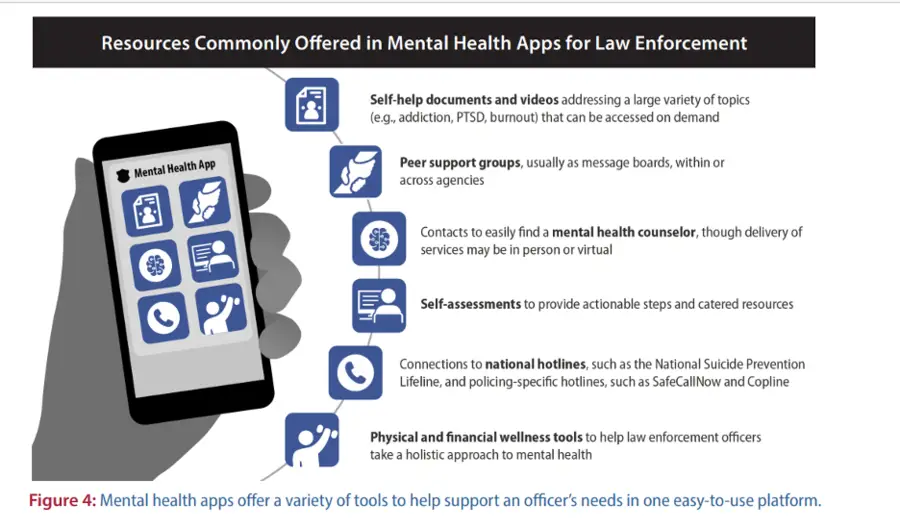A Landscape Study of Mental Health Applications for the Criminal Justice Testing and Evaluation Consortium Program
Objective
To study application software products (“apps”) designed for law enforcement officers for potential implementation by law enforcement agencies. To help understand the “state of the shelf” for apps, including existing apps, their value, and what law enforcement should consider before buying an app.
Approach
RTI identified nine apps available to law enforcement agencies, interviewed agencies that use apps, scanned existing literature, and engaged with app developers to better understand app usage and considerations for law enforcement agencies offering the products to their officers.
Impact
While the report indicated areas of improvement for mental health apps, the apps serve as a confidential source for law enforcement officers seeking mental health services. Agencies now have a clearer sense of what mental health apps can and cannot do, informing future decisions for their teams. The report also indicated that research is needed to determine effectiveness of the use of these mental health apps.
Police Stress & Mental Health in the United States
The number of people living in the United States who face mental health conditions increases daily. Recent reports show that multiple stressors contribute to declining mental health, including social media, isolation, loneliness, and the recent COVID-19 pandemic. These factors, and efforts to decrease the stigma around mental illness, have resulted in employers and other organizations addressing the adverse impact of mental health stressors and viewing mental health as an element of holistic occupational wellbeing.
Law enforcement agencies are presented with a unique set of considerations when addressing the mental health of their officers. The occupation has multiple challenges, including chronic stressors and acute traumatic experiences, and studies have shown that law enforcement officers are more likely than others outside the profession to experience depression, anxiety, substance use, and post-traumatic stress disorder (PTSD). The decline of an officer’s mental health can lead to adverse decision-making and performance, which in return, affects the organization and the protection and safety of the community.
Despite more widespread recognition of job stress for police officers, many barriers remain when seeking mental health services. Law enforcement officers are likely to underuse voluntary mental-health related services for varied reasons, including stigma of seeking help, concerns with using workplace resources (e.g., being considered unfit for duty), or accessibility of services. Additionally, small and rural agencies cannot afford or do not have access to mental health programs. Mobile apps are gaining popularity among law enforcement agencies as an easy-access, affordable, and confidential delivery method to provide mental health services.

Criminal Justice Testing and Evaluation Consortium landscape study for mental health apps
Although agencies are increasingly relying on mental health apps to support their officers, little is known on whether these apps are effective and worth further investment. The Criminal Justice Testing and Evaluation Consortium (CJTEC), a program of the National Institute of Justice (NIJ), partnered with RTI Innovation Advisors and the Center for Policing Research and Investigative Science to create a report that informs law enforcement partners on the landscape value of mental health apps created specifically for law enforcement users. The goal of the CJTEC is to promote the realistic adoption of technology in law enforcement, courts, correction, and community supervision. Part of its role is serving as an “honest broker” to cut through marketing language and help leadership make informed purchasing decisions. For this project, RTI Innovation Advisors contributed an understanding of human-centered design, technology insights, and markets, and the Center for Policing Research and Investigative Science brought mental health and law enforcement experience.
This report focuses on what the apps offer to their users, their limitations, and what should be considered while implementing them within law enforcement agencies. To better understand benefits and limitations of the apps, the landscape study included the following:
- Scan of existing literature to understand how wellness applications may help address unmet needs
- Consultation with experts, practitioners, and other key stakeholders
- Soliciting market input for products to provide extensive information of on-market mental health apps created specifically for law enforcement needs
- Synthesizing information to understand and communicate user-informed opportunity and realities of these tools
Studying Nine Mental Health Apps for Law Enforcement
RTI identified nine mental health apps specifically designed for law enforcement officers. We also identified agencies who have adopted these apps or similar products. We contacted the app vendors to better understand their product, features, and customer type. Through an extensive review, along with expert interviews with decision makers in law enforcement agencies, our team identified gaps in the technology for officers seeking mental health care.
Key Findings and Challenges
Through our investigation, RTI found both significant differences and similarities in the mental health apps identified by this study for use by law enforcement agencies. Regardless of any differences, law enforcement agencies who have implemented apps have reported positive feedback from officers regarding their impact on mental wellness. However, the study also found that there is no scientific evidence on whether mental health apps offer value for users, including users in law enforcement settings. Additionally, we found wide ranges in prices to access these apps. In some cases, agencies are met with a significant paywall to access the apps and their benefits, with prices ranging up to tens of thousands of dollars for a 100-person agency.
Benefits of Using and App for Officers Seeking Mental Health
Despite their limitations, mental health apps offer unique benefits for law enforcement officers. Seeking these services through an app offers confidentiality to officers who are concerned about privacy and accessibility. Historically, addressing mental health has been a stigmatizing topic and, at times, associated with negative consequences like being declared unfit for duty or prohibiting advancement in the workplace. The apps allow officers to engage with mental health services without the knowledge of fellow officers or the agency. In addition, some apps offer multiple resources within one platform. There are limitations to the level of intervention an app can provide; however, it creates an opportunity for officers who might not seek mental health services otherwise.
This landscape study provides law enforcement agencies with useful guidance on potential implementation of mental health apps. It also serves as a groundbreaking study for mental health providers and app developers for the creation of new and improved mental health apps geared towards law enforcement officers. This report emphasizes the need to understand the value of mental health apps, generally and specifically, with the law enforcement population. It emphasizes the need for additional research and understanding – through this realistic perspective, it will help law enforcement decision-makers assess and invest in interventions that are truly value adding, accessible, and effective. When officers receive better mental health care, it benefits not only their personal wellness but also their families and the communities they serve. RTI is proud to be at the forefront of addressing mental health challenges for law enforcement agencies and officers.
Learn More about RTI Innovation Advisors and RTI Center for Policing Research and Investigative Science.
Full Report
Read More- Criminal Justice Testing and Evaluation Consortium, NIJ





